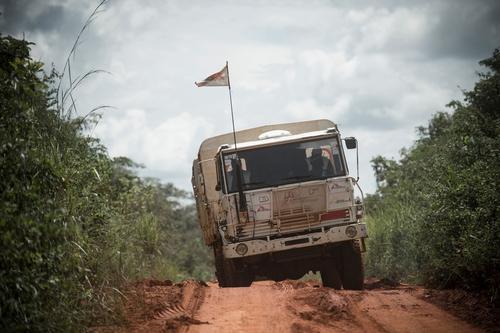A volatile security situation in Bambari, in Central African Republic’s Ouaka province, is having an impact on the town’s residents and partially reducing aid agencies from responding to people’s urgent health needs. While the barricades set up in recent days have now been dismantled, violence by undisciplined groups and the armed robbery of civilians are still a daily occurrence, and the atmosphere in the town and its environs remains tense. Residents of Bambari are living in fear. In recent days a group of armed men even forced their way into Bambari hospital, sending patients running.
In this situation, providing medical care to those who need it is challenging, even for an impartial humanitarian organisation such as Médecins Sans Frontières. MSF’s team was forced to temporarily restrict its movements after some team members became trapped by violence on the far side of the river which bisects Bambari. The team has since restarted its medical activities, running mobile clinics for both the Christian and Muslim communities, with a focus on those most urgently in need.
As well as running mobile clinics, MSF’s team has been following up 12 patients with violence-related injuries at Bambari hospital, run by the Ministry of Health and other humanitarian actors. Most had wounds from grenades and gunshots, including one with multiple wounds, three with severe abdominal wounds requiring laparotomies, and three with fractures. One patient died.
The insecurity is having an impact on people’s ability to access medical facilities, while hindering aid organisations from providing humanitarian assistance. For some days, MSF’s team was unable to reach the five health centres which it supports. However, the team had managed to pre-position dressing and stabilisation kits for treating wounded patients in case of major needs.
The situation is also tense in the area around Bambari, where medical care is even less available. An MSF mobile team was able to reach Ngakobo, 66 km south of Bambari, where some 9,500 displaced people are sheltering. In two days, the MSF team provided 427 consultations in the camp and in a nearby village, mainly for patients with malaria and respiratory tract infections. MSF has also launched a response to provide and increase adequate supplies of clean water in the camp.
“On the way to Ngakobo, there was such a contrast between the beauty of the landscape and the emptiness of the ghost villages, left in ruins and emptied of people because of the attacks,” said Martin Braaksma, MSF’s head of mission in CAR. “In other villages, residents are too afraid to go to the fields to work. People are trapped by the violence.”
The medical effects of the violence come on top of people’s regular health needs and the lack of free quality medical care in CAR. In the Bambari area, MSF is running six ’malaria points’ to diagnose and treat malaria, which is one of the main health problems in CAR, particularly for children. In the Bambari area in January, MSF’s team treated 3,231 patients for malaria, more than 40 percent of whom were children under the age of five.
MSF has been working in Bambari since May 2014.



